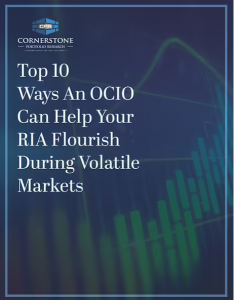For an independent broker-dealer, regulatory compliance can be a significant challenge. It almost seems to grow further whenever you’re trying to deliver the best possible experience for your customers. Regulatory expectations continue to change, but staying ahead of those expectations while continuing to deliver value can seem overwhelming, at times.
It’s even more challenging when you’re not sure where to start with any subsequent changes necessary for meeting the latest rules through Regulation Best Interest (Reg-BI). However, this is where the tide may easily be turned: An outsourced Chief Investment Officer (CIO) may be just the solution that you need.
This article covers the following topics:
- Especially now, staying REG-BI-compliant is vital
- It’s not just documentation; data quality factors in
- What is an outsourced chief investment officer?
- How an Outsourced CIO Helps You Keep Compliant
Especially Now, Staying REG-BI-Compliant Is Vital
Staying compliant with the FINRA Rule 2111 (the Suitability Rule) has long been important for independent broker-dealers, but it is vital now, in 2023. We must be extra vigilant in transparently safeguarding clients’ investments (and document everything) while also protecting our own reputations and bottom line.
Fitting the bill means demonstrating that you are acting ethically as well as taking appropriate steps to ensure compliance with all applicable rules and regulations. This includes proper training, technology implementations, software upgrades, proper documentation procedures, and other processes, if necessary.
Completing the annual Regulatory Element content may or may not take longer than it used to: The necessary length of time depends on things like the number of registrations you hold and the amount of prescribed content involved. Generally speaking, the amount of content you’re required to complete in a three-year cycle for a specific registration category may be about the same.
However, the sheer volume of rule changes and regulatory issues may mean more required content for some particular categories. Similarly, if you hold more than one registration, you may be tasked with completing other additional content for each additional registration category that you hold.
The upside may be that you won’t be subject to duplicate regulatory content within a given year for holding multiple registrations. The most common combinations of registrations will probably retain much of their regulatory content from year to year. Regardless, as demands for transparency keep increasing, so does a firm’s workload.
It’s Not Just Documentation; Data Quality Factors In
There’s no getting around it: All firms must document their compliance processes—and the days of scribbled notes on scratch paper are long gone. In addition to proving that your advice is beneficial to customers, broker-dealers also have to provide evidence of how they arrived at a given decision. This includes demonstrating that you took every reasonable step to gather and analyze information related to transactions beforehand.
The need for comprehensive documentation means a growing challenge for many firms: You have to keep accurate records and make sure all customer data is up-to-date and secure. You also have to be painstakingly accurate. Any discrepancies or inaccuracies could result in hefty fines or other penalties from the FINRA or the SEC.
To make sure you meet these requirements, you must have a decent system for gathering and validating customer data in place. As a result, you need technology solutions good enough to reliably guarantee the accuracy of collected customer data.
A sufficient system must be able to quickly identify discrepancies. It also has to alert users when something doesn’t match up with established criteria or historical trends. You probably want something designed for scalability enough to be adjusted easily as regulations change further over time.
Do You Want More Horsepower Behind the Counter? You CAN Afford It. Here’s How.
What Is an Outsourced Chief Investment Officer?
An Outsourced Chief Investment Officer (OCIO) is a professional that joins your team, providing all the benefits of a physical, in-house executive, often for less money. This service provider can help an independent broker-dealer with access to high-level investment advice and portfolio management services. At the same time, this is far from all that the OCIO model can potentially do for you.
One of the biggest benefits of having an outsourced chief investment officer is that it takes away some of the pressure from individual members at a broker-dealer. By offloading much of the responsibility for Reg-BI compliance onto one person or team, you can free yourself up to focus on planning, nurture existing client relationships, and pursue growth.
A properly-vetted OCIO will be a knowledgeable professional with years of experience in the financial industry. As a result, they are often able to provide valuable insight into a variety of other back-office matters, as well. They might even meet with clients, at your discretion (providing a premium service you could opt to optimize your fees for).
Your outsourced CIO, meaning your new team member, really does join your roster: Although most, if not all interactions with them will be online (e.g., via Zoom), you can list their bio on your Our Team or About Us page. There are no bonuses or benefits to pay, however. You don’t even have to provide a parking space, so, in a sense, you get to have your cake and eat it, too.
How an Outsourced CIO Helps You Keep Compliant
 The primary benefit of having an outsourced CIO is that it takes much of the burden off of you when it comes to staying compliant with Reg BI. An experienced one will understand what needs to be done in order to stay within the bounds of regulation while at the same time helping you maximize profits and increase efficiency. Additionally, they can provide valuable insight into other areas.
The primary benefit of having an outsourced CIO is that it takes much of the burden off of you when it comes to staying compliant with Reg BI. An experienced one will understand what needs to be done in order to stay within the bounds of regulation while at the same time helping you maximize profits and increase efficiency. Additionally, they can provide valuable insight into other areas.
Today’s ever-changing regulatory environment can leave you scratching your head, wondering what’s next. It may never have been so essential for independent broker-dealers to stay up-to-date with FINRA and SEC requirements. However, one of the easiest ways to do this is by hiring an experienced OCIO to help you review existing investment related processes and procedures.
With their help ensuring that all investments follow Reg BI guidelines, while still providing maximum returns for clients, you might be able to catch your breath. Cornerstone Portfolio Research is ready to show you the long-term benefits. Contact us to learn more.


